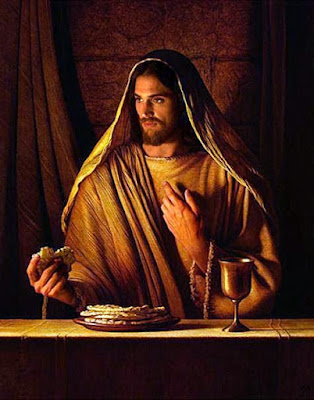THE EUCHARIST, OUR PLEDGE AND HOPE OF LIFE.
August 8, 2021
Nineteenth Sunday in Ordinary Time
READINGS: 1 Kgs 19:4-8; Ps 34:2-3, 4-5, 6-7, 8-9; Eph4:30—5:2; Jn 6:41-51.
A Native American Mohawk proverb says: “Life is both giving
and receiving.” And a Maltese proverb adds: “If you don't eat you will die;
overeating will shorten your life.”
Bread is for life. But it is not all that man eats can
sustain him longer in life. Look at your own life. Is there a routine more
monotonous than eating? Morning, noon, and evening you hang upon food. And as
if that was not enough, in between those moments of time, some have an
additional routine called snacks or Merenda. After sleeping, eating seems to
occupy a great and undeniable portion of our life. If you do not eat, you will
die. But strange enough, though we eat, we still die, and some even die of what
they have eaten or for having eaten too much.
Material food, even though it can sustain life, does not
assure us life. Only one meal has this ability to do so, the one the Lord
gives— His word and body as the bread of life.
For us, Christians, the surest pledge of life can be found
only in the Holy Eucharist, the given Body and Blood of our Lord for our life.
“There is no surer pledge or dearer sign of this great hope in the new heavens
and new earth "in which righteousness dwells," than the Eucharist.
Every time this mystery is celebrated, "the work of our redemption is
carried on" and we "break the one bread that provides the medicine of
immortality, the antidote for death, and the food that makes us live forever in
Jesus Christ." CCC 1405.
In the first reading, to the Prophet Elijah in pilgrimage at
the encounter of the Lord at his Holy Mountain, the Horeb, the Lord God gave
food to strengthen him. Elijah, in his great anguish, fleeing from Queen
Jezebel and questioning about his vocation and the Lord, was given a miraculous
food through an Angel. We hear that in his great despair, Elijah prayed for
death saying: “This is enough, O Lord! Take my life, for I am no better than my
fathers.” He was fed up with sorrows and hopelessness due to his sad fate. But
then, the Lord fed him and raised him back to hope. The food given by the Angel
sustained the Prophet for forty days’ journey towards the Horeb. Here, in that
passage, we have a prefiguration of the Eucharist as pilgrimage bread, food for
our spiritual journey at the encounter of the Lord.
In the Gospel, Jesus continues his catechism on the bread of
life, after the multiplication of bread to feed the five thousand men. The Lord
today insists on telling his listeners, "I am the bread that came down
from heaven". But this proclamation of himself scandalizes the people who
find it hard to believe because knowing his origin, "the son of
Joseph." The Lord, however, pushes farther, affirming that of the Manna
was not being the bread from heaven and for life but only bread for a moment of
the journey, the crossing of the Sinai desert. And the Lord adds, “Your
ancestors ate the manna in the desert, but they died.” The only food that can
sustain life is not the material food, but the spiritual one, Jesus: “This is
the bread that comes down from heaven so that one may eat it and not die.”
The Eucharist is our hope of glory and pledge of life. For,
the Lord assured us, “whoever eats this bread will live forever; and the bread
that I will give is my flesh for the life of the world.”
Our world goes through difficult moments and faces suffering
and death because we have lost the meaning of the Eucharist as bread for our
life and its sacrality. Many people, day after day desacralize the Holy
Communion by approaching it unworthily. Not only do they no longer see in it,
Christ's true presence, and so his Body and Blood, but they also fail to see in
it something that can provide life. We oftentimes banalize this holy and
unblemished sacrificial offering of Christ given for our life.
Every time that we partake unlawfully in the Holy Eucharist,
we sadden the Spirit of Christ and corrupt his Body. Paul in the second reading
will advise on how we should live as people of God nourished by the bread of
life: “be imitators of God”. That means, “All bitterness, fury, anger,
shouting, and reviling must be removed from you, along with all malice. And be
kind to one another, compassionate, forgiving one another as God has forgiven
you in Christ.”





Comments
Post a Comment